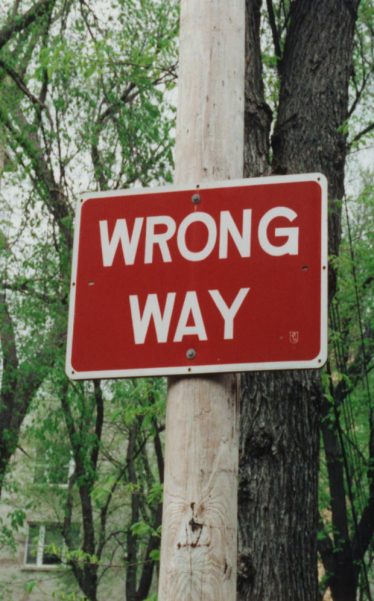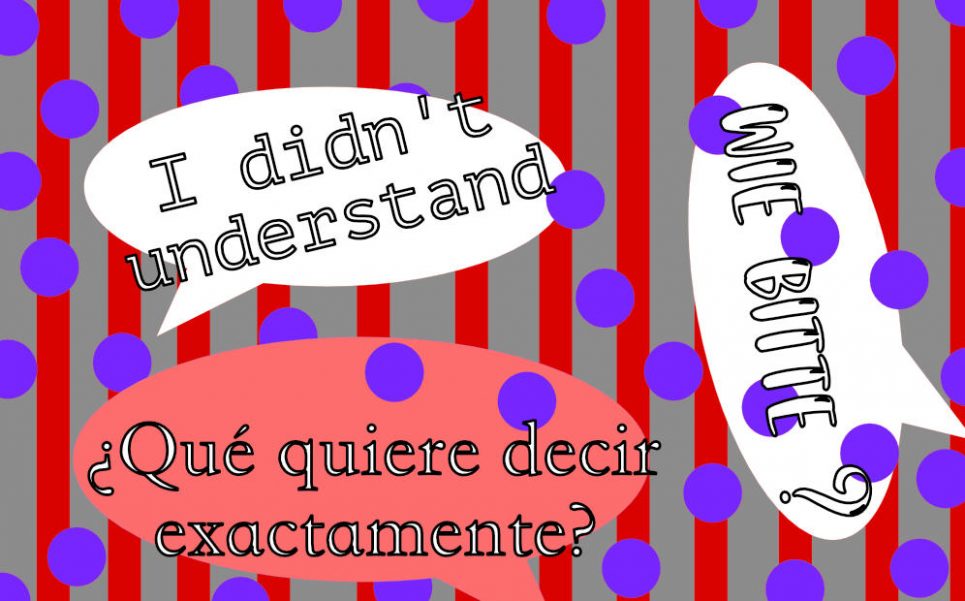There is a moment when you are confused and you try to make sense on your own. You write or talk to whoever will listen and it’s all very abstract and nobody, not even you after a while, knows what you’re talking about. But that moment is vital and if it happens, and you reach a certain age, your default mode ends up being that there is no meaning, because you haven’t found it. We’re in that period.

I don’t expect you to think about what I say relating it to me because they are things that almost nobody knows, but that you relate it to life itself, do you understand? Even if it hasn’t happened to you, try to understand it a little bit because, I don’t know if they told you in language or some other subject that things have to be read more than once for understanding and I am not clear enough to have to be read more than once, because things don’t always have an easy explanation. No.
Obviously, it is easier to deny what is stated by the interlocutor explicitly than what can be deduced from a work of interpretation why would anyone go to that trouble? They can say “no”, “what?”, “I don’t understand you”, but this is still a crude example.
The reality is worse, you don’t even partially establish the possibility that you would want to say all that paragraph so that they deny it to you.
To expose yourself to talk is to expose yourself to silence, a response much worse than detriment. To speak, you end up falling into a cliché that, yes, has something tender, a trite element that is good sometimes, validating yourself with phrases like “that’s life” and the minimum conformity that at least you left something implicit, even if it is resignation, with an accomplice look that leads to nothing, because from that cliché, with that look, to that incomprehensible paragraph and to the understanding of the other there are millions of light-years away. Then the set phrases do not help you.

In the middle of every minute, I could have a thought that saves me if I can interpret it well. Why is there something that makes me have to erase it? Why is it that what reaches the closest walls of my mind and even my mouth is dazed and distorted if that could help me? What should I do to learn from everything and be able to overcome once and for all those obstacles? Is it an intention of potential that I can never reach? That nothing is good enough so it is better than nothing?
There is someone who may think that the best solution is to be direct, say what you think without nuances whatever it is and something will remain, but the huge answer of reality, sad and sudden in front of a new silence can not be other than the two most terrible words to those who are looking for rules: sometimes.
Because it is not only that, it is not only you and your mind, it is the other, to choose the other and that the other accept you while you seek to understand you, beyond any rule of decency, that really and actively listens to you. But it is enough to think and reconstruct in one’s own mind the thoughts of the other to begin to break a relationship.
In this sense, you can be deceived or deceive yourself as to how much of the interaction is true. When, away from all the double entendres, ironies, veiled criticisms, and all the opinions that you and the other may not agree on, you feel there is a real connection and in the end, there is not.
Those are the relationships that make you paranoid, they are the ones that don’t let you be calm, with their lack of emotional honesty; with their card under the table, even if they think it’s what you need and at a particular moment it does you good, nothing is resolved. It may also be your fault, that they really tried and it was you just not being able to see their frustration, their impossibility, or worse, seeing it and getting frustrated because you couldn’t find a way around it.
This is what I used to do, start with a very abstract statement:
I don’t understand these people
Towards a victim who listens to me and responds:
It changes absolutely nothing for you in the least
Yes, because if I understood them, I could take advantage of them.
But you don’t understand them, which is neither good nor bad for you.
No, it’s bad for me, it’s bad for me. Whatever it is, it’s bad not to understand, you feel silly.
This person even tries to empathize with a side comment, but there is a limit to everything and asks what we are talking about:

Okay, I share the sentiment but what is it that you don’t understand?
What makes them live, what do they gain by behaving that way, what the fuck is so entertaining about talking about what they talk about
Then who:
And what are they, politicians? people, who live on gossip? who?
I don’t make it easy for them:
Normal people
Deep down I think I understand
And even I am surprised, although the warning is there: it is “deep down”:
Do you understand?
Like they were born that way and they are made for that and that nothing and nobody will be able to change them, and that’s why they are the way they are.
Even with the assumptions that I’m not normal (and that this person isn’t either, given that she speaks in the third person), I don’t encourage her for her effort, I follow her:
Yes, well, that’s more than understanding, it’s accepting, but what good does it do you?
That you resign yourself to their change and live your life without even thinking about them for a second?
Yes, well, but if I don’t find more people like me soon it will be impossible. I need them at least for the most trivial things like going out dancing, playing tennis or soccer, because that’s what they are there for me.
If you place yourself in a space of alienation, that’s where they will find you. It doesn’t help to make references to using people:
It’s kind of weird what you say anyway.
I know that I wouldn’t have a good time in a club with someone who looks a bit like me, for example, but with a guy I have nothing to talk about, maybe I would.
He makes a last attempt to put the situation back on track with humor:
The solution: look for people who like to party.
Yes, the truth is that I tried
But there is a limit to everything. And if you make someone else responsible for your depression, for your ghosts, it’s too much. You can’t demand something like that from anyone.
But where do you live? On Mars?
Both high expectations and very low ones are a problem. Expecting too much or not expecting anything from the other to communicate can only get you so far, but you still need a partner for all this, and, every now and then, your mind again wants to make you believe that you found it without much effort on your part, just by having exchanges like this one:
What I don’t like is to see that the other person is like they don’t know what to say to me, when you are always the one who has to follow the thread of the conversation to continue talking or even create a new one, that happens to me a lot.
So you tend not to answer?
Sometimes you can see it when the conversation doesn’t last long.
Or the conversation becomes monotonous and one-sided.
The most common representation is the “What do you say?”
“¿AND? Tell me something.”
But why don’t they follow the thread of the conversation, what do you consider that is not monotonous outside the metacommunication, are the elements that you don’t see in that first moment of communion and then affect death. I had that same conversation with someone, now I reproduce it and I like its content, but I do not have the slightest memory of who I had it with, it is still superficial.
Talking permanently with someone about something you agree with is as stupid as talking about something you know you will never agree with.
It is in the possibility of convincing someone of something, even if it is minimal, that is the emotion, the life: from conquering someone and having an interview with whom you get a job to this: how to project my will to live, to ask for a meeting point and to exercise it with everyone. And that possibility is, in fact, minimal.
Your failed experiences shape you.
On the part of the other party alone, there is a very quick facility to assume that everything was understood the first time, without the right to reply or the benefit of the doubt. But that is dangerous, it entitles the other to recompose our statement if we assume he is honest, and to misrepresent if we assume he is perverse. Both are equally harmful if you want to be seen as you are.
The other important point is interruptions. My dream, literally my dream when watching movies or reading books is to have that kind of conversation where I can say something and another person, whether they agree or disagree with what I say, waits for me to finish to respond, which I only see in situations of authority. It is complicated because I have to choose between trying to impose myself by turning up the volume, going on and not listening well to the other person or to myself, or modifying my speech on the fly if the other person’s statement warrants it.

Something that cannot be established correctly here is the channel, everything seems so pristine on a page when we use the tools that language gives us, but it is different when in reality there are noises of cars, passing trains, loud music, or, my favorite, people who speak softly or do not modulate, I am one of them, we have established it. People abbreviate when repeating, say it with a different intonation (more angry or cheerful), or give up.
Sure, being patient and open to possibilities even when you have failed over and over and over again is important but it is not everything and, in many cases, not even enough. I try with all my might to know what the other person is thinking until I turn red and my head explodes. I don’t talk anymore because I don’t think I have the capacity to do so, I stop interning. Others don’t speak because they think it’s none of their business. That’s how everyone keeps quiet.
This can happen to others. A communication problem is a community problem, of the reach of a virus to the mind that can affect the body and you grow and the need to use more and more complex words to explain what you seem mandatory as if the simple ones were lesser. You assume that you are better or that you are not good for this. And you give up. I don’t want to find another way to say the same thing by complicating the language. I want to better understand a part of the truth of myself.
Even in the case of considering all these aspects when elaborating a statement with the essence of the first one, your interlocutor may not understand it or, even worse, may understand it, and may never look you in the eye in the same way again, but it is all you can do to grow. Either way, I asked you for the salt


